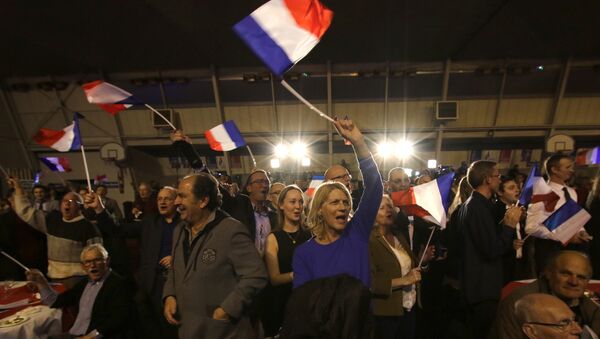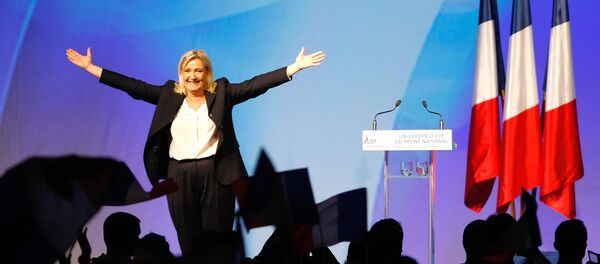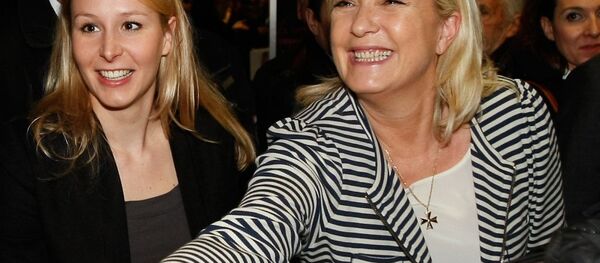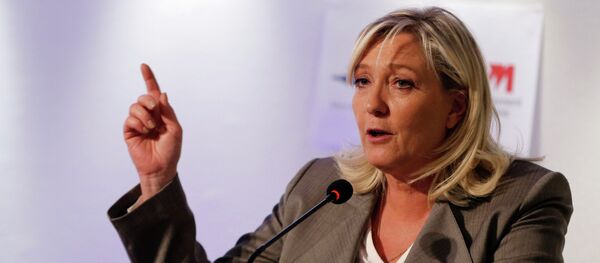The victory, described as a "historical breakthrough" by French and foreign political experts alike, marked another defeat for the ruling Socialist Party. The Socialists, with 22.7% of the vote, lost ground to both the National Front and the center-right Republicans of former French President Nicolas Sarkozy (the latter securing 27% of the vote).
Despite having 44.6 million eligible voters, turnout was a paltry 51%. The regional elections are the last before the presidential and parliamentary elections, scheduled for 2017.
While analysts are divided over the consequences of the right-wing eurosceptic party's victory, they seem to be in agreement over the causes: many voters are simply fed up with the ruling Socialists, and with the political establishment as a whole.
Speaking to Sputnik, Danielle Simonnet, Paris Councilwoman and National Secretary of the Left Front opposition electoral federation, explained that the right's victory was in large part the result of the disillusionment of the left's electoral base in Francois Hollande's Socialist Party.
"There is a feeling of resentment," Simonnet noted. "This government, from the very start of the presidency of Francois Hollande, has pursued a policy very similar to that of [former president] Nicolas Sarkozy's government. This naturally not only sows discord among the left, but is also disheartening for people who say to themselves that in the end, the Republicans and the Socialists pursue the same anti-social policies."
Christian Hutin, a National Assembly MP and member of the leftist-Gaullist Citizen and Republic Movement, told Sputnik that he thinks that the problem is much deeper.
"Attempting to block the National Front's path is a motto of the last century," Hutin noted. "Today such an approach is obsolete. If before, voting for the National Front was a protest vote – a sign of indignation and discontent among the masses…today it is practically the result of commitment to the ideas of the party."
The decline of the civic spirit instilled by the French Revolution, and the feeling that the country is in danger, are to blame, according to Hutin. "The French people today believe that their country has become 'permeable' – that it no longer protects them as they would like."
Jacques Myard, a Republicans MP who was also interviewed by Sputnik, believes that "France's political establishment did not want to answer to the public's fundamental needs." The National Front's victory, in his words, "is a reality – a reality, in my opinion, made as a stern warning from those who want to be heard. I believe we need to listen to this message."
Interestingly, the commentary of the opposition left largely echoes that of the National Front itself.
National Front General Secretary Nicolas Bay, an MEP and head of the party list in the region of Normandy, told Sputnik that "a lot of our citizens are turning away from the traditional parties — from those who fell short of their promises. Frustrated by both the right and the left, people see in the National Front a real political force of the future, and have put their hopes in our movement. I think that the combination of sober judgment, the appropriateness of our proposals, and the quality of our political team have worked to ensure the National Front's success."
From Fringe to Mainstream
With Sunday's results again demonstrating that the formerly fringe National Front is now fully capable of breaking into the mainstream, Alexandr Shatilov, the Dean of Sociology and Political Science at the Financial University under the Government of the Russian Federation, explained that this has everything to do with the shifting political culture inside the party itself.
Interviewed by Russia's Svobodnaya Pressa, Shatilov explained that despite claims to the contrary in much of the French and foreign media, he "would not call the National Front an ultra-right party."
According to Shatilov, the National Front "has undergone a sort of rebranding as of late," becoming a 'big tent' for those disillusioned with ultraliberal ideology. His meaning of the concept reflects its use in France, to describe pro-multinational business, pro-immigration and pro-EU strategies which are often seen as being at odds with the traditional French welfare state.
"The National Front's constituency now consists of many different segments of the population," the expert noted. "More so than a party of nationalists, it is a party of European traditionalists; that is, people who are opposed to the widespread inculcation of liberal individualist values, and who are for the preservation of European identity. As a result, people from various social groups and of varying ideological convictions vote for the National Front."
Asked why much of the Western and Russian media continues to see the National Front as a fringe-right political force, the expert noted that "on the one hand, it's a habit; some journalists really just don't realize that the party has changed significantly." Naturally, of course, some media is opposed to Marine Le Pen's party for ideological reasons, "attempting to discredit the National Front," including over its friendly relations with Russia. "And so they continue to conduct their silent campaign to subvert the party."
Implications for Relations With Russia
Commenting on the possible implications of Sunday's results for relations with Russia, Shatilov noted that "in a France where people vote for traditional values, it will naturally be easier to establish communications with Russia. Of course, if Marine Le Pen had been the head of a gang of radical fascists, there would be nothing in common with us. But as I've said, the National Front is now a respectable European political party, with good prospects."
Attempts to sideline the National Front were already made at Sunday's elections, with the Socialists pulling candidates in three regions and telling supporters to back their moderate opponents – the Republicans.
The situation is further complicated, according to Shatilov, by Washington's considerable influence on the political process in France.
"Experience has shown that if in some European country there is a danger of a non-systemic, anti-American or even overly 'pro-European' leader coming to power, Washington is not averse to using any means possible to quell it. It is enough to recall the removal from the political scene of Dominique Strauss-Khan [smeared by an alleged sex scandal in 2011], an independent politician who in his own time was believed to be a very viable presidential candidate."
"In the case of Marine Le Pen," Shatilov noted, "the American elite, along with their French counterparts, will do everything possible to prevent her from coming to power."
"Nevertheless," the expert is convinced that "the latest success in the regional elections will only further grow the popularity of the National Front and its leader, Marine Le Pen. The acquisition of a serious administrative resource in the regions will strengthen their positions considerably."
For his part, Boris Shmelev, the head of the Center for Political Studies of the Institute of Economics at the Russian Academy of Sciences, is convinced that the National Front's continuing advance on the French political scene is "anything but accidental." Sunday's victory, he believes, "looks to be the beginning of a process of change, not only in France, but throughout the Old World. It is apparent that in a few years, we will see the rise of a very different Europe."








